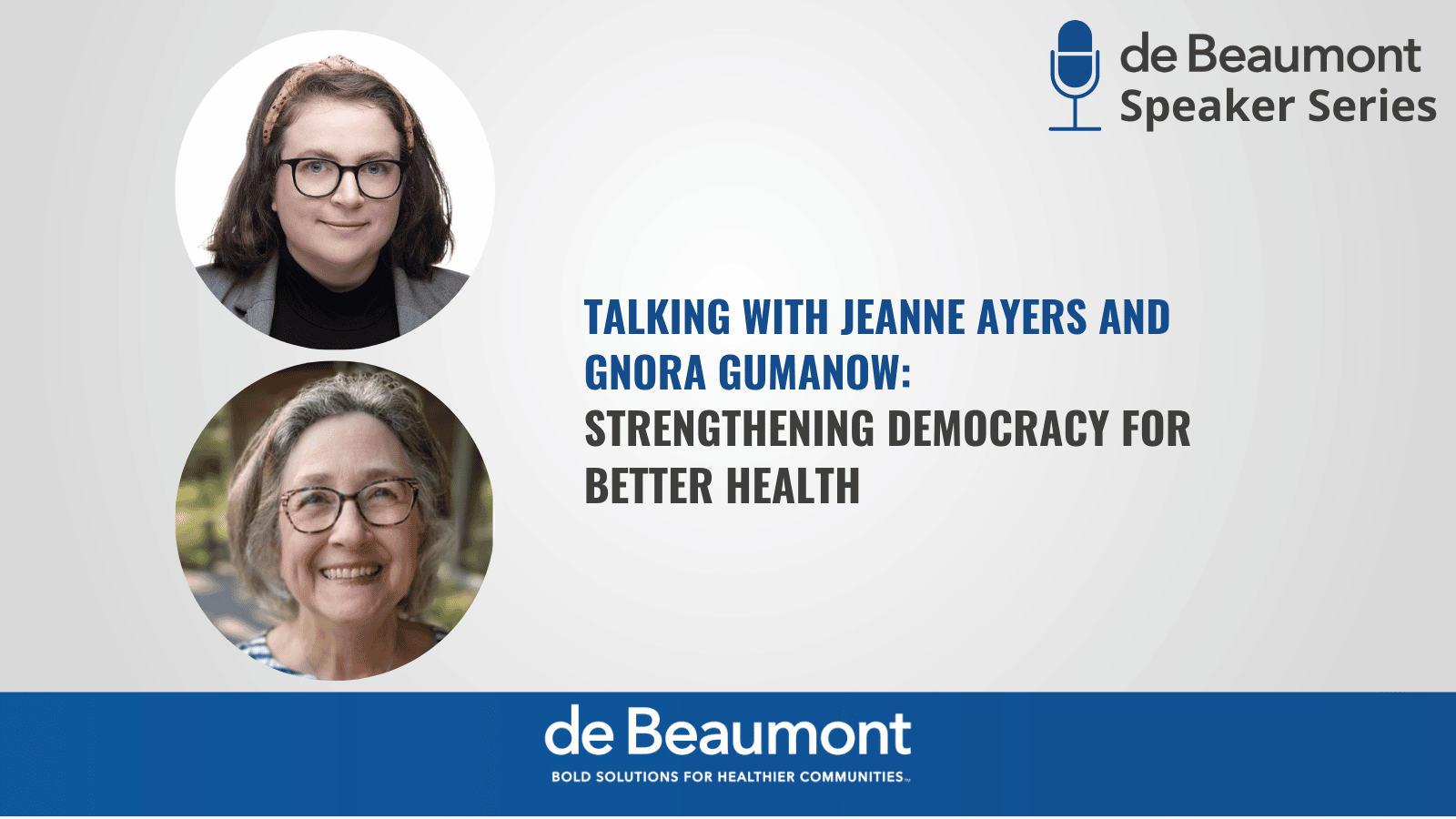The de Beaumont Foundation’s Speaker Series highlights leaders in public health practice, advocacy, policymaking, and other related fields.

Formed in 2020 as VoteSAFE Public Health, Healthy Democracy Healthy People seeks to advance health equity through more accessible, inclusive, and just means of voting and civic engagement. The non-partisan coalition of leading public health organizations convened at a pivotal time, when threats to health equity and racial justice were becoming more visible amid the COVID-19 pandemic. With the 2020 election season on the horizon, issues of voting access and oppression were also urgent to address.
“[The public health community] came to the table because of the pandemic, but we should have always been at this table,” Healthy Democracy Healthy People Executive Director Jeanne Ayers, RN, MPH, said at a de Beaumont Foundation Speaker Series event. “We were very clear when we first came together that we weren’t saying voting was about washing your hands before you voted or wearing a mask, but that inclusion and voting are important and that they’re good for our health.”
Research from Healthy Democracy Healthy People underscores the benefits of civic participation to health. Its Healthy Democracy Index comparing 12 public health indicators and voter turnout to the 2020 Cost of Voting Index shows how influential voting policies are to the health of communities.
“When we looked at the research, we were amazed at how clear the pattern was where states with more voting access and civic participation had better health outcomes,” Ayers said. “And when communities vote, they influence policy decisions, and that has a big effect on their health, but even just the inclusion [matters].”
Ayers and Healthy Democracy Healthy People Partnerships Director Gnora Gumanow, MPH, talked to de Beaumont Foundation staff about how a strong democracy leads to better health outcomes. The following highlights from the conversation have been edited for length and clarity.
How is voting connected to health?
Jeanne Ayers: We cannot underestimate the health impact of inclusion, just belonging and inclusion, and having a public acknowledgement that we matter. So that’s one aspect to the to the voting and representation. Another is the more agency you have in your life, the better and healthier you are. The agency of exercising and becoming an actor in your life is actually health protective and health producing, so moving from a critiquing and cynicism and isolation because things aren’t the way we want.
That process of becoming an actor deepens relationships, clarifies who you are and what your values are and what you care about, and so voting is just an act in that portfolio.
Gnora Gumanow: There’s a pretty big body of research on the role of social cohesion as a mitigating factor in health, in that communities themselves that have better social cohesion — and sometimes civic participation is included as a measure of social cohesion — have better resiliency facing natural disasters, have better health outcomes overall. So I think the act of voting is part of inclusion.
But it’s also an expression of social cohesion for an entire community, and really illustrates how our systems go hand in hand with creating that social cohesion that creates self-efficacy, self-belief systems, and that individual empowerment to take control and make decisions about your health, about your community, and the policies that impact both of those.
What does voting mean for community voice and power?
JA: The act of voting is the act of which we create a social contract that says we’re giving the right to be governed to a set of people that we helped choose. And when we erode that, we’re eroding that sense of having a social contract.
Historically, we know that when we’ve expanded the franchise that health has improved. Unfortunately, what we’ve seen more recently is an assault on all of that, and between the gerrymandering and restrictive policies, we’re seeing less sense of representation. But it doesn’t just happen. We have to make it happen. We have to make the whole system work for us. And that’s why I think health and public health have an important role.
GG: I think there’s a much broader debate about representation and how that impacts policy. But I think a big focus first needs to be on how we elect leaders that reflect our values and our communities. And that is really about the re-enfranchisement and enfranchisement of voters in every community across the country, which has not been the focus of the Supreme Court and other parts of our government for the last 20 or 30 years. Instead, it’s been, unfortunately, the opposite.
What is your elevator pitch for the public health case for voting?
JA: I make this case all the time to my family, that we’ve looked at the data, and it’s very clear that the more inclusive the voting opportunity, the higher the level of voter engagement and participation, the better the health of the broader community, which benefits all of us. And therefore, it’s incumbent upon us to make sure that we’re promoting inclusive laws.
GG: We need to look at the systems that govern our democracy and our society, and come to terms and ask the questions about, How do we create inclusivity? How do we create a representative democracy? Because we know that a representative democracy and an inclusive society fosters better health across the spectrum and for everyone in our country.




